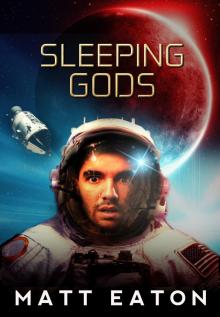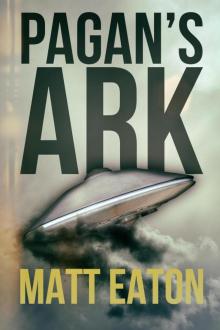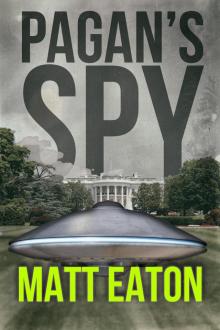- Home
- Matt Eaton
Pagan's Ark Page 4
Pagan's Ark Read online
Page 4
“We landed in Rome and the sarcophagus has been in this room ever since. I have spent all of my time in the past seven years cloistered in this chamber.”
As Father Paulson told the story the apparition of Utnapishtim remained statue-like just a few feet away. Every now and then Donovan glanced at him, and found the eyes of the ghost staring right back at him.
“When did he — Utnapishtim — start talking to you?”
“It was some time after our arrival in Rome. Several weeks later. But only ever me. Nobody else.”
No wonder the poor man had been driven half mad.
“Pius granted me full access to the church archives, and allowed me to consult linguistic experts in both ancient Egyptian and Sumerian languages. We had begun by studying the writing on the sarcophagus exterior.
“The text spoke of a great flood that wiped out Utnapishtim’s kingdom. It said this flood had been the wrathful intervention of a people called the Ryl. There was no mention of such a people anywhere in ancient history, but my studies led me to conclude that in other ancient Sumerian texts the Ryl were also known as the Anunnaki – gods who came down from heaven to live on Earth.
“These Anunnaki declare themselves as nothing less than the creators of modern humanity. At first, I saw this as no more than ancient superstition, something not to be taken literally. But then Utnapishtim appeared to me. Like Mother Mary at Lourdes. A miracle. And from that moment, human history as we know it began to unravel before my eyes.”
Donovan knew what the priest was suggesting but found it hard to believe. “You really think this apparition is the ghost of Utnapishtim?”
Paulson nodded eagerly. “But no ghost. He’s alive... inside the coffin.”
“How is that possible?”
“He told me he was awoken many years ago, perhaps when the sarcophagus was first unearthed. He began to realize he could travel outside his body at will, but for a long time thought he was only dreaming. I don’t think he meant for me to see him, but because I have spent so much time in this room with the artefact, something in me has changed too. Everyone else who comes here — even the Pope himself — sees nothing. They humor me, but I know what they think.
“I write down everything he tells me, and much of it is fantastical. They think I’m insane. I’ve been called a heretic by some in the Curia — much of what Paolo tells me contradicts the Holy Roman Church’s version of history.”
“Why the two different names?”
Paolo spoke to this himself. “I am not the man I used to be.”
“But who are you?” Donovan turned back toward Paulson. “Who was he?”
“Utnapishtim was the last antediluvian king of Sumer. His reign ended when a Great Flood wiped out his kingdom – around 4000 BC. According to Paolo, it wasn’t God who caused the Flood, it was the Anunnaki. They had an overpopulation problem. Basically, the hybrid humans they had genetically engineered to be their slaves were breeding like flies. The flood was meant to wipe them out.”
“That’s one hell of a story,” said Donovan.
“In biblical terms,” said Paulson, Utnapishtim was Noah. I mean he is the historical figure the Biblical story of Noah is based upon. Do you see the scale of the issue?”
“And you say the sarcophagus itself has a warning not to set him free? Why?”
“The writings tell the story of his incarceration and entombment. He acted against his masters. Apparently, it was something unforgivable. Utnapishtim was one of the Nephilim. The Bible called them fallen angels. In fact, they were cross-breeds. Half human, half Anunnaki.”
“He’s half human...?”
Paulson reached across the desk, opened his Bible. “As in Genesis 6: ‘...the sons of God saw the daughters of men that they were fair; and they took them wives of all which they chose ... There were Nephilim on the Earth in those days; and also after that, when the sons of God came in unto the daughters of men, and they bore children to them, the same became might men of old, men of renown’.”
“It actually says that in the Bible?”
“The Ryl are the sons of God,” said Paulson. “Utnapishtim might be half human, but he is also one of them. They chose not to kill him because they had no taste for killing one born from their own flesh. There were so few of them here on Earth, you see. The sarcophagus was a compromise, though in many ways might be seen as a fate worse than death, a sort of living death.”
“Is the Holy Father aware of... all you’ve discovered?”
Paulson nodded. “But of course, I’m a problem for them. They don’t know what to do with me. I suspect some would lock me in a sarcophagus of my own, given half a chance. I wouldn’t put it past them.”
“Come now, Father, this is the Vatican, not the Mafia.”
Paulson laughed out loud. “Have you ever heard it said that we taught the Mafia everything they know? I hear so many secrets down here, so many. Whispers in amongst the bookshelves. Things nobody would dare say aloud above ground. We lie by omission. The books I’ve unearthed — they’d shake St Peters to its foundations. We hide it all, to protect the faithful. But it must be for the best. After all, the Pope’s infallible, isn’t he?”
He was venting. But it was like Donovan was the first person he had spoken to in years and all the poison was being released. How much of this was truth and how much fantasy was anyone’s guess. Pius was right; Paulson was a danger both to himself and the church.
Before Donovan had time to consider what might be done about it, Utnapishtim — Paolo — materialized right beside Paulson. Father and son. The ghost and his familiar. Donovan was so alarmed by it, he cried out in shock. He felt his heart pounding but couldn’t take his eyes off the otherworldly apparition. Paolo had a faint glow, like he was lit by his own inner light. Alluring and disturbing all at once.
Donovan took a moment to breathe in an effort to calm himself down. He pointed over his shoulder in the direction of the sarcophagus in the room adjacent, and spoke to the apparition. “If you’re alive in that box, you’re no ghost — how are we able to see you?”
“You see me as I wish to be seen,” he answered.
Donovan said, “I take it there is a reason you wish to be seen by me.”
Paolo smiled. “I need you to set me free.”
Paulson stood up anxiously. “No. We have spoken about this, Paolo. We can’t do that.”
But Paolo only had eyes for Donovan now. “I possess knowledge of great value to you and your king.”
“I take it you mean President Truman. Go on.”
“Promise to set me free and I will reveal to you this knowledge.”
Donovan shrugged, trying to play a bluff. “You’ll need to do better than that. What could you possibly know that we would consider valuable?”
Paolo stared back at him for an uncomfortably long time. So long, in fact, Donovan wondered whether he understood. Finally, he said, “A craft capable of space flight. Technology beyond your imagination. I can direct you to its location. Your president would find such a vessel to be of interest, no?”
“Tell you what,” said Donovan. “You lead me to a craft like that and I’ll set you free myself.”
“No,” Paulson pleaded. “Mr Donovan, Bill — please don’t make that promise. I won’t allow it.”
“I’m sorry, old sport,” said Donovan, “but it’s not your call.”
CHAPTER 7
Donovan was the last to arrive for the meeting in the Pope's private office. The morning sun poured through windows and reflected brightly off the gleaming marble floor tiles, which lent the office an air of openness, as if to cast light upon even the darkest of matters.
Bernadino Nogara and Cardinal Giuseppe Pizzardo were already seated across the table from the Holy Father. Donovan bowed his acknowledgment to the Pope, then to the other two men, trying to read the room as he took his seat. Almost immediately he began to sense trouble, like he was a penitent hoping for absolution. Pope Pius sat back in his high-backed whit
e chair, his white robes creating the odd impression that he was garbed in the chair itself, that he and the office were one.
Pius said, "Cardinal, I believe you wish to speak first."
Cardinal Pizzardo nodded and smiled briefly then began his character assassination. "Your Holiness, I have given this matter a great deal of consideration. It is my conclusion that if General Donovan insists on pursuing his operation, he must do so without the help of Father Paulson. But it would be best, I feel, if it were not to occur at all." Pizzardo's tone was quiet but firm. As he mentioned Donovan by name he glanced briefly in his direction, but his words were meant entirely for the Pope, who was staring at his own hands as if in prayer.
Pizzardo was the Holy Father's new chief inquisitor. A devout 'company' man, he spoke five languages and had faithfully served in Rome for his entire career. After spending many of those years rising to greater levels of responsibility inside the Congregation for Extraordinary Ecclesiastical Affairs, he had shown himself to be valuable in foreign and diplomatic relations. Today, however, he spoke as the newly appointed Cardinal Secretary to the Supreme Sacred Congregation of the Holy Office, once infamously known throughout Christendom as the Inquisition.
As the Pope's main man in the church's eternal fight against heresy, Cardinal Pizzardo was tasked with confronting all serious threats to the purity of Catholic doctrine. In this regard, Donovan knew he was about to declare Clarence Paulson as public enemy number one.
"In my opinion, and I am not alone in this," said Pizzardo, "Father Paulson is suffering from a serious mental illness. While contained within Archivum Vaticanum, his madness has been kept from the broader awareness of the Curia. But our compassion, I fear, has led to corruption of the soul. For too many years, allowances have been made for his unorthodox views. Father Paulson must never be allowed to travel beyond the borders of Vatican City. Further, I have obtained a medical recommendation that he be hospitalized at once. I have a doctor ready to prescribe an immediate course of electro-convulsive therapy."
Pope Pius nodded solemnly. Nogara sat stoic and unmoved; this was not his fight. He hardly needed to be present at all, but today it was a blessing. Donovan seemed to be the only man in the room troubled by the suggestion that a cleric was ready to have a fellow priest committed for shock treatment he didn’t need. Pizzardo simply wanted to shut him up.
“I take it you’re saying I too am suffering from the same mental illness,” said Donovan angrily.
“That is not for me to say,” replied Cardinal Pizzardo. “But you have been exposed to the artefact. It is possible, you must admit, General, that exposure to this casket induces some form of madness.”
“It’s possible,” Donovan conceded. “It’s certainly possible.” Alarmed by this sinister turn of events, he decided to throw his ace on the table. "Holy Father, there is one certain way to determine Father Paulson's — and my — state of mind. Surrender him to my care. Let us travel to the Middle East to determine whether these claims are genuine. You will know soon enough if our trip is in vain." Donovan opened his mouth to continue, but Pizzardo interjected, “I really don’t...”
The Pope held up a hand to shut him down." Let’s try to keep this civil, shall we? William has not finished speaking."
"Thank you," said Donovan. "The artefact I intend to pursue, assuming it exists, would be of great value to the United States. It would also be highly prized in the Soviet Union. Such an object could prove to be of enormous strategic value to them. Particularly if they found a way to weaponize it."
As intended, this caught the attention of Bernardino Nogara. By Nogara’s hand the church had been a major investor in the global armament trade during the war. Donovan could almost hear the wheels turning in the man’s head now. He was under no illusions as to Nogara’s motivations. In 1945, Donovan had been privy to a top-secret report from an OSS operative saying someone in Rome named 'Nogara' (no first name was offered) controlled a cell of Nazi spies. The allegation was never verified, and by the end of the war there was little appetite to pursue it. True or not, stories like this demonstrated one thing: Nogara was an avowed capitalist. He could always be trusted to act against the communists.
"Could you not travel to Lebanon without Father Paulson?" asked Pius.
Donovan shook his head. "If this operation goes ahead, it must be with his involvement."
They all knew who Donovan was referring to as the one who must be appeased. Nobody wished to say the name aloud.
"Perhaps General Donovan has a point," Nogara said.
It was almost like Pius was waiting for Nogara to make the decision for him. "Very well," said the Pope. "William, I surrender Father Paulson to your care. I trust you will take good care of him."
"My life for his," said Donovan.
CHAPTER 8
April 28, 1951
General Fouad Chehab stood solemn and silent as an adjutant ushered Donovan and Paulson into his office. Chehab was in full dress uniform, his khaki jacket bedecked in medals and shiny epaulettes, his hat placed perfectly upon his head. He was not a tall man —Donovan towered over him — but he stood his ground regally behind his plain wooden desk and it was clear his formality was to be viewed as a mark of respect. The commander of the Lebanese Armed Forces was a man of noble birth and a Maronite Christian, meaning, Donovan hoped, he might look favorably upon their request.
As the door to the General’s neat and simple office closed behind them, Chehab breathed out and appeared to visibly relax, suggesting he was as much concerned with keeping up appearances for his men’s sake as with ingratiating himself to a high-ranking visitor. The General stepped woodenly toward them, reaching out somewhat awkwardly to shake their hands. But when he opened his mouth, his reaction displayed genuine warmth. “It is my pleasure to meet you both. May I welcome you to our fine country. Mr Donovan, I have heard many wild and famous stories about your days in the war.”
Donovan smiled. “Some of them are even true, General.” Chehab let out a belly laugh and patted him on the back. Donovan knew from that moment they would get along just fine. “We are very happy to be here, and we appreciate you taking time to see us.”
Chehab sat down again, urging them to do the same as he pulled a cigarette loose from the packet of Camels on his desk. “But what, pray tell, is it you think I can help you with?” He lit the cigarette and blew the smoke high into the air above his head where it hung like a thought bubble, then held out the packet to his visitors. Both men politely declined. In truth, cigarette smoke turned Donovan’s stomach. He had always considered it a filthy habit. Camel cigarettes in particular smelt like burning cow dung, though he figured it best in this instance to keep that opinion to himself.
The LAF commander’s position was designated a Maronite Christian role after French colonial rulers reluctantly agreed to Lebanon’s independence in 1943. It was thought a Maronite commander would be best placed to prevent the nation’s various religious factions from killing one another. Maronites were the dominant Christian denomination in Lebanon, though they numbered no more than a quarter of the population in total, meaning Chehab always had to battle to maintain respect and position. Honor, rank and pride were unquestionably important to him. But Donovan also knew guns and ammunition were even more important. Respect came more easily when you were well-armed, and the LAF was notoriously short-supplied.
“As a representative of the US Treasury, I am very pleased to be able to confirm our government will supply the LAF with 500 M1 semi-automatic rifles as well as 500 M3 sub-machine guns, along with 50,000 rounds of ammunition. I understand this might prove useful to you.”
Chehab drew hard on his cigarette and smiled like a child on Christmas morning. “It will prove very useful indeed, Mr Donovan.”
“That’s very good. I can arrange to have them delivered to your headquarters in less than a fortnight, if that is suitable.”
The General nodded appreciatively. “That would be most satisfactory.” He sat back i
n his chair. “Tell me sir, what is it I may do for you?”
Donovan smiled. The man was no fool. “There is something that would be of great assistance to us. We must travel to the town of Baalbek on a mission for the Holy Father. I would very much appreciate an armed escort to ensure our passage in and out of the town.”
General Chehab considered this. “For what do you need this escort?”
Donovan had a cover story at the ready, but on a whim he took a chance. “General, how much do you know about the history of Baalbek?”
“Named after the Phoenician god Baal. The Romans called it Heliopolis. My father took me there when I was a boy. I remember the Temple of Jupiter. Beautiful.”
“There is something even more amazing beneath those Roman ruins,” said Donovan.
“Yes, yes,” said Chehab excitedly, “the massive stones under the temple platform. Nobody knows who put them there. Maybe the Romans or maybe the Phoenicians.”
“Massive indeed. The biggest three weigh about 1,000 tons each,” said Paulson. “And they’re surrounded by layers of other stones that are 400 to 600 tons. Remarkable...”
“And not of Roman origin,” said Donovan, who now felt the priest’s baleful stare but kept talking regardless. “Those megaliths predate both the Roman and Phoenician civilizations.”
“Really? I will have to take your word for this,” said Chehab who, like most generals, took rather unkindly to having his ignorance pointed out to him.
“I mean no offence, General,” said Donovan. “What I’m trying to explain is that Father Paulson has spent years researching this location at the Vatican archives. There is a relic of particular value to both the Holy Roman Church and the US Government that is hidden deep within the ruins of Baalbek.”
Chehab puffed once more on his cigarette as he pondered this. “What kind of relic could be of such value to you both?”
“You might find it hard to believe the answer. But I trust and respect you, so I will say this plainly. We believe there is an ancient flying saucer buried beneath the ruins of Baalbek.”

 Sleeping Gods
Sleeping Gods Pagan's Ark
Pagan's Ark Pagan's Spy
Pagan's Spy Blank Extra Chapter
Blank Extra Chapter